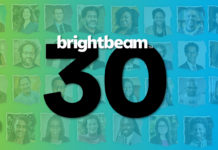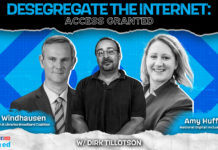“The internet should be for everyone.”
Those six words describe Chris Lewis’s mission for the last two decades. Lewis is the president and CEO of Public Knowledge, which “promotes freedom of expression, an open internet, and access to affordable communications tools and creative works.” They also “work to shape policy on behalf of the public interest.”
Which is why Oakland education and internet access activist Dirk Tillotson knew he needed to host Lewis on the second episode of Citizen Ed’s Desegregate the Internet.
Lewis focuses on the concept of “digital redlining” in internet access. Public Knowledge describes it this way: “The same neighborhoods that were once redlined by banks and insurance companies now face similar discrimination by internet service providers, which adds to an already substantial digital divide.”
On the latest episode of Desegregate the Internet, Lewis walked Dirk through some of the ways we can soon eliminate major barriers to access. Watch the full episode below and like and follow us to tune into the next installment.
Think of the Internet Like Phones
Lewis said what the U.S. did a century ago for the telephone is exactly what we should do today with the internet: Use laws and other public policies to guarantee connections everywhere in the country. Today, 99% of the United States has a phone connection. We can get there with high-speed broadband, and Lewis said it may already be in motion—if Congress passes the two major infrastructure bills currently being written.
A major part of this would require some inspiration from the history of the telephone.
“Why aren’t we holding internet providers accountable?” Dirk asked. The accountability the country decided on for phone companies—regulate them like public utilities—is what Lewis urges policymakers to do today to internet service providers.
Why is this so important to do?
“If your internet connection is even spotty right now, trying to work from home is a mess,” Dirk said. It’s worse when multiple family members are stuck at home, with multiple devices, all trying to get their most important priorities done. Think about what that means for kids who can’t log on for their digital learning during this wave of rising delta variant cases of the COVID-19 pandemic.
And in some rural communities, there is no such thing as an internet connection. How are those students supposed to learn safely?
Lewis and Dirk agreed that the (hopefully) upcoming infusion of federal investment in internet infrastructure—laying fiber cables, launching satellites beaming internet service, using television broadcasting signals to boost internet signals, etc.—will help students for decades to come.
But it’s not there yet. It’s not law. Desegregate the Internet will follow this story wherever it goes. Follow us on Facebook and YouTube so you don’t miss an episode.










